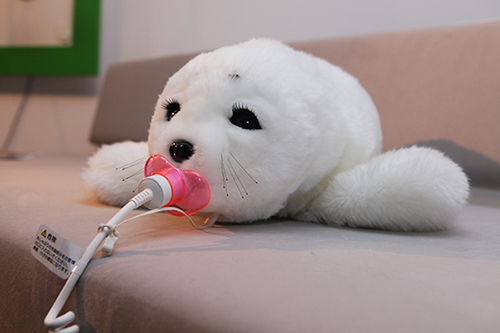
Saturday, October 21, 2017
11am–3pm
McLuhan Centre for Culture and Technology
39 Queen’s Park Cres. E., Toronto
Hosted by Letters & Handshakes
FREE and OPEN TO THE PUBLIC.
Please RSVP to reserve your seat.
Presented in conjunction with the exhibition Care Work on view at the Blackwood Gallery from October 16–November 4, 2017, and as part of Take Care, Circuit 2: Care Work

Care, Automated
Workshop with Amelia Abreu, Marc Böhlen, Hermenio Lima, Ian Roderick, Sarah Sharma, David Harris Smith, Frauke Zeller
Hosted by Letters & Handshakes
Saturday, October 21, 11am-3pm
McLuhan Centre for Culture and Technology
39 Queen’s Park Cres. E., Toronto
FREE and OPEN TO THE PUBLIC.
The habit of attaching “care” to innately positive attributes obscures its entanglement with dominant systems of power and control. The ambivalence of care is crisply reflected in technological configurations of care/work. In this workshop, seven researchers share their inquiries into intersections of care and technology, in particular, automation. Questioning technological fixes to care crisis, Care, Automated examines how care work’s ongoing machinization coexists with and deepens, rather than disrupts, entrenched social hierarchies and prevailing economic imperatives. Beyond providing critical diagnostics, however, the workshop also sets out to consider how technologies of care/work might be ethically and collaboratively reimagined.
Sarah Sharma takes current discussions of caring robots as an opportunity to highlight the already robotic forms of care and intimacy that comprise gendered commitments and forms of normativity tied to capital. Ian Roderick examines how social robots, programmed to intercede between therapist and patient in Autism Spectrum Disorder behavioural therapy, function as metaphors and mediators of caregiving. Amelia Abreu proposes axioms for understanding the relationship between care and technology, and explores the meaning of the automation of care in a service-oriented economy. Hermenio Lima, David Harris Smith, and Frauke Zeller will discuss a multidisciplinary research project to develop mixed physical and virtual human-robot interaction in the area of healthcare communication to leverage knowledge mobilization and behavioural change. Imagining a future in which machines and not people are the last sentient entities a dying person will see before death, Marc Böhlen presents speculative designs for a “robot to die with.”
This workshop is presented in partnership with and funded by the McLuhan Centre for Culture and Technology, Faculty of Information, University of Toronto.
Amelia Abreu is a writer and design researcher based in Portland, Oregon, and the founder of UX Night School. Her writing on technology and culture has appeared in various publications. She holds a B.A. from Evergreen State College, an MSIS from the University of Texas-Austin, and an MS from the University of Washington.
Her presentation is titled Automation and Affect: Care Ethics and Systems at Scale.
Artist-engineer Marc Böhlen (a.k.a. RealTechSupport) imagines and designs information systems that reflect on automation as cultural currency. Böhlen is Professor of Media Study at the University at Buffalo and is co-creator of the online resource “Robots for Last Days.” His projects query the relationship between people and automation at large, generating unexpected qualities from quantitative processes.
His presentation is titled Robots to Die With.
Hermenio Lima is Associate Professor and a Dermatologist and Clinical Immunologist. He is the Head of McMaster University Dermatology division and is the Director of the McMaster Centre for Clinical Dermatology. Lima completed his PhD in Tropical Public Health at Harvard School of Public Health. He was trained in biostatistics and has led multiple large-scale clinical trials and experimental studies.
Ian Roderick is an Associate Professor in the Department of Communication Studies at Wilfrid Laurier University. He is the Special Issues Editor for Critical Discourse Studies and recently published Critical Discourse Studies and Technology: A Multimodal Approach to Analysing Technoculture (2016). His research interests include technology and culture, militarism, and critical discourse studies.
His presentation is titled Robot Therapy and the Remediation of Care.
Sarah Sharma is Associate Professor of Media Theory at the Institute of Communication, Culture, Information and Technology and Director of the McLuhan Centre for Culture and Technology at the University of Toronto. She is the author of In the Meantime: Temporality and Cultural Politics (Duke University Press, 2014) and is currently working on a new book that explores the gendered politics of exit and refusal, or what she terms the ‘(s)Exit’ within contemporary techno-culture.
Her presentation is titled Understanding Robots: The Extensions of Mommy.
David Harris Smith is Associate Professor in the Department of Communication Studies and Multimedia at McMaster University. Smith’s recent cultural robotics project, hitchBOT: The hitchhiking robot, has been exhibited in galleries and museums and received international media coverage. Smith is the lead researcher on the SOSCIP Virtual Cities Environment project, a 3D city-modeling platform.
Frauke Zeller is Associate Professor in Ryerson’s School of Professional Communication. She has extensive experience in Human-Robot Interaction, with her PhD thesis dealing with a linguistic analysis of interactions between robots, virtual agents, and humans. Together with Dr. Harris Smith she is the co-creator of hitchBOT, Canada’s first hitchhiking robot.
This workshop is presented in partnership with and funded by the McLuhan Centre for Culture and Technology, Faculty of Information, University of Toronto.
The Blackwood Gallery gratefully acknowledges the operating support of the Canada Council for the Arts, the Ontario Arts Council, and the University of Toronto Mississauga.

The Blackwood Gallery is grateful for additional support for Circuit 2: Care Work from the Department of Visual Studies (UTM); McLuhan Centre for Culture and Technology, Faculty of Information (UTSG); Parkland on the Glen Retirement Living; The Revue Cinema; Streetsville Public Library; Student Housing and Residence Life (UTM); Women and Gender Studies (UTM); Visual Arts Mississauga; University of Toronto Affinity Partners Manulife, TD Insurance, and MBNA.
Funding for additional staff support was made possible through the Young Canada Works in Heritage Organizations program, Department of Canadian Heritage. The Canadian Museums Association administers the program on behalf of the Department of Canadian Heritage.
